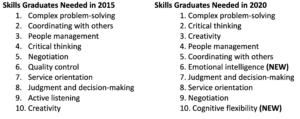
Skills Today’s Graduates Need to Succeed
By: Tim Elmore
I graduated from college with good grades, but not straight As. Part of the reason was, I worked two or three jobs every year of my college life. I worked as a cook in a country club, I worked part-time in the library, I worked as a part-time youth director, and I worked at a fast-food restaurant. While I appreciated my professors and classes, I felt I learned as much on these jobs as I did in the classroom. Six of my fellow students graduated with straight As but could not find a job for several months. Upon my graduation, I was choosing between five job offers.
As I reflect on this, I’m reminded of how important it is to think holistically as parents, coaches, educators and youth directors. Employers tell me they don’t ask about a graduate’s GPA in job interviews. They do ask about how they’ve practiced soft skills needed to collaborate on a team. The new hire discovers a classroom often looks very little like a work room. The National Center for Education Statistics, the Journal of College Student Retention, and the Journal of Student Affairs Research and Practice have all published research saying students can benefit from having part-time jobs. In fact, studies show working students often make better grades.
My friend, Dr. Debra Murdock, recently shared the skills graduates need to succeed. They have changed a bit over the last several years. Almost none of them are about academics:

Notice the two new skills that made it on the top ten list in 2020.
Emotional intelligence. Employers agree that the graduate’s IQ might be high enough to do the job, but their EQ may be lacking. Emotional intelligence is what we mean when we talk about “social and emotional learning” (SEL). The issue has been politicized by so many that we lose sight of what these competencies really mean. It means we develop self-awareness, self-management, social awareness, and relationship management skills in our students. That’s what educators ask us to help them do when they utilize our Habitudes® for Social and Emotional Learning.
Cognitive flexibility. This is sometimes known as “cognitive shifting.” It means how well a student can deliberately switch between mental processes to generate appropriate behavioral responses. We shift our body to change direction. We shift our car into a new lane to avoid danger. We can also learn to shift our thinking process to become more adaptable to the situation at hand. This is what we mean by cognitive flexibility. It’s what I talk about in my book, Eight Paradoxes of Great Leadership. We must read the people in front of us before we lead them.
When students get “stuck” (which has happened more since the pandemic hit us), they can become paralyzed and fail to adapt to a new environment or to new pressure. When anxiety is high, flexibility can evaporate. We must move students from FRAGILE to AGILE.
When students focus only on academics and fail to develop interpersonal skills, they become less attractive to an employer. There are few realities more common than a graduate who has a high GPA but who cannot work well with teammates or model social skills.
What Predicts Success After Graduation?
Organizational psychologist Adam Grant writes, “The evidence is clear: academic excellence is not a strong predictor of career excellence. Across industries, research shows that the correlation between grades and job performance is modest in the first year after college and trivial within a handful of years. For example, at Google, once employees are two or three years out of college, their grades have no bearing on their performance.”
What does help is first-hand experience.
In fact, when former Boston University student Melissa Cottrell was in school, she said that working part-time actually helped her become more disciplined. “The busier I am, the more focused I become,” she told BU Today. “Working really makes you more structured; you have a lot of things to do in a short amount of time, so it’s important to keep up with it all.”
Dr. Grant continues, “Academic grades rarely assess qualities like creativity, leadership and teamwork skills, or social, emotional and political intelligence. Yes, straight-A students master cramming information and regurgitating it on exams. But career success is rarely about finding the right solution to a problem — it’s more about finding the right problem to solve.” This may explain why Steve Jobs finished high school with a 2.65 GPA, J.K. Rowling graduated from the University of Exeter with roughly a C average, and the Rev. Dr. Martin Luther King Jr. got only one A in his four years at Morehouse.”
Let’s commit to building social and emotional skills, as well as cognitive flexibility in our young people. If we will, they stand a better chance at making straight As in life.






